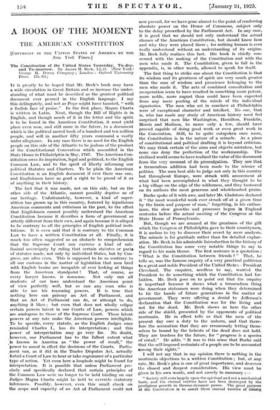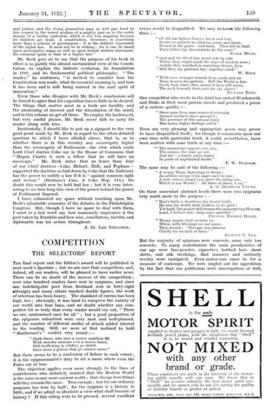A BOOK OF THE MOMENT
THE AMERICAN CONSTITUTION
[COPYRIGHT IN THE UNITED STATES OF AMERICA BY ME
New York Times.] IT is greatly to be hoped that Mr. Beck's book may have a wide circulation in Great Britain and so increase the under- standing of what must be described as the greatest political document ever penned in the English language. I say this delibeerately, and not as Pope might have taunted, " with a foolish face of praise." In the first place, Magna Charta is written in Latin. Next, though the Bill of Rights is in English, and though much of it in the letter and the spirit is to be found in the American Constitution, it must yield place even now, and still more in the future, to a document which is the political sacred book of a hundred and ten million people, and will in another fifty years command a vastly wider allegiance. In any case there is no need for the English people on this side of the Atlantic to be jealous of the product of the Constitutional Convention which assembled in the State House in Philadelphia in May, 1787. The American Con- stitution owes its inspiration, legal and political, to the English Common Law, and to the spirit of liberty informing our political Statutes and Charters. To be plain the American Constitution is an English document if ever there was one, and Englishmen have as good a right to be proud of it as of anything in their history.
I The fact that it was made, not on this side, but on the other side of the Atlantic, cannot possibly deprive us of our heritage. Unfortunately, however, a kind of super- stition has grown up in this country, fostered by injudicious American comments and criticisms in the past, to the effect that Englishmen cannot possibly understand the American
Constitution because it describes a form of government so utterly different from their own, and again because it is alleged
to be contrary to all the principles of English political insti- tutions. It is even said that it is contrary to the Common Law to have a written Constitution at all. Finally, it is much too often suggested as an obstacle to comprehension that the Supreme Court can exercise a kind of sub- liminal sovereignty by ruling that certain statutes or parts of statutes made, not only by individual States, but by Con- gress, are ultra vires. This is supposed to be so contrary to all our customs in the matter of legislation that men bred with English brains are incapable of ever looking at things from the American standpoint ! That, of course, as every lawyer knows, is nonsense. Not only can all students of our laws understand the American point of view perfectly well, but so can any man who is able to use his reasoning powers. It is true that nothing here can gainsay an Act of Parliament, and that an Act of Parliament can do, or attempt to do, anything it likes ; but even that does not wholly eclipse certain powers latent in our Courts of Law, powers which are analogous to those of the Supreme Court. These latent powers at any rate make the American powers intelligible. To be specific, every statute, as the English Judges once reminded Charles I., has its interpretation ; and this power of interpretation may go very far. No doubt, however, our Parliament has to the fullest extent what ,IS known in America as " the power of recall," the power to annul in effect the decisions of the Courts. Parlia- ment can, as it did in the Trades Disputes Act, actually forbid a Court of Law to hear or take cognizance of a particular type of action. Yet even here a loophole might be found for interpretation. It is possible that unless Parliament prc- cisely and specifically declared that certain principles of the Common Law were no longer to be held binding on our Judges Magna Charts might be held to override statutory inferences. Possibly, however, even this small check on the scope and capacity of an Act of Parliament could not now prevail, for we have gone almost to the point of conferring absolute power on the House of Commons, subject only to the delay prescribed by the Parliament Act. In any case, it is good that we should not only understand the actual clauses of the American Constitution, but should know how and why they were placed there ; for nothing human is ever really understood without an understanding of its origins. Mr. Beck fully realizes this fact. His book is chiefly con., cerned with the making of the Constitution and with the men who made it. The Constitution, given in full in the appendix, is, in other words, allowed to speak for itself.
The first thing to strike one about the Constitution is that its wisdom and its greatness of spirit are very much greater than the sum of wisdom and prescience belonging to the men who made it. The acts of combined consultation and co-operation seem to have resulted in something more potent, more noble, more august than could have been expected from any mere pooling of the minds of the indis idual signatories. The men who sat in conclave at Philadelphia were of exceptional character and intellect. No one, that is, who has made any study of American history need feel surprised that men like Washington, Hamilton, Franklin, Morris and Madison, to name only a few, should have proved capable of doing good work or even great work in the Convention. Still, to be quite outspoken once more, the Constitution is in the nature of a miracle. As a piece of constitutional and political drafting it is beyond criticism. We may think certain of the aims and objects mistaken, but none can deny the perfection of the workmanship. The civilized world seems to have realized the value of the document from the very moment of its promulgation. They saw that a tremendous addition had been made to the science of politics. The men best able to judge not only in this country but throughout Europe, were struck with amazement at what had been accomplished in what they thought to be a big village on the edge of the wilderness, and they bestowed on its authors the most generous and wholehearted praise.
Burke spoke of it with awe, and later Mr. Gladstone declared it " the most wonderful work ever struck off at a given time by the brain and purpose of man," forgetting, in his enthus- iasm, the slow growths and processes begun in England centuries before the actual meeting of the Congress at the State House of Pennsylvania.
But, though we are amazed at the greatness of the gift which the Congress at Philadelphia gave to their countrymen, it is useless to try to discover their secret by mere analysis. The miracle is for gratitude rather than for detailed explan- ation. Mr. Beck in his admirable Introduction to the history of the Constitution has some very notable things to say in regard to his main theme. The first sentence is a quotation : " What is the Constitution between friends Y " That, he tells us, was the famous enquiry of a very practical politician to a great and noble President of the United States—President Cleveland. The enquirer, needless to say, wanted the President to do something which the Constitution had for- bidden. Mr. Beck goes on to point out that the enquiry is important because it shows what a tremendous thing the American statesmen were doing when they determined to tie the hands of future generations in the matter of government. They were offering a denial to Jefferson's declaration that the Constitution was for the living and not for the dead. Mr. Beck shows us here the other side of the shield, presented by the opponents of political mortmain. He in effect tells us that the men of the present day owe a duty to the unborn, and that there- fore the accusation that they are erroneously letting them- selves be bound by the behests of the dead does not hold. They are trustees for the future, for " progress is a species of entail." He adds, " It was in this sense that Burke said that the self-imposed restraints of a people are to be accounted among their rights."
I will not say that in my opinion there is nothing in the mortmain objections to a written Constitution ; but, at any, rate, Mr. Beck's plea is one of great importance, and deserves the closest and deepest consideration. his view must be given in his own words, and not merely in summary :— " Society still rests largely upon the spiritual and not a mechanical basis, and the eternal verities have not been destroyed by the prodigious growth in thermo-dynamic power. The great purpose of the Consttution is to assert these eternal verities of liberty and justice, and tho living generation may as well pay heed in this respect to the tested wisdom of a mighty past as to the noble beauty of a Gothic cathedral, which is not less inspiring because its builders are dead. A constitution, therefore, is something more than a scheme of government ; it is the definite expression of the higher law. It need not be in writing ; for it can be based upon prescriptive usage as well as upon formal written statement. Its essential spirit is that of a higher law."
Mr. Beck goes on to say that the purpose of his book in effect is to justify this almost sacramental view of the Consti- tution—to explain the historic evolution, its formulation in 1787, and its fundamental political philosophy. " The reader," he continues, " is invited to consider how the Constitution was made, what its essential meaning is, and how it has been and is still being marred in the mad spirit of innovation."
Even those who disagree with Mr. Beck's conclusions will be forced to agree that his exposition leaves little to be desired. The things that matter most in a book are lucidity and the awakening of interest and the stimulation of the mind, and in this volume we get all three. To employ the hackneyed, but very useful phrase, Mr. Beck never fails to carry his reader along with him.
Incidentally, I should like to put up a signpost to the very good point made by Mr. Beck in regard to the often debated question to which I have alluded above, that is, as to whether there is in this country any sovereignty higher than the sovereignty of Parliament—the view which made Lord Chief Justice Coke say in the House of Commons that " Magna Charta is such a fellow that he will have no sovereign." Mr. Beck notes that no fewer than four of our Chief Justices—Coke, ilobart, Holt, and Popham—
supported the doctrine as laid down by Coke that the Judiciary has the power to nullify a law if it is " against common right and reason." (Bonham's Case, 8 Coke Rep. 114.) No doubt this would now be held bad law ; but it is very inter- esting to see how long this view of the power behind the power of Parliament lingered.
I have exhausted my space without touching upon Mr. Beck's admirable summary of the debates in the Philadelphia Congress. But, though I have no space to deal with them, I must as a last word say how immensely impressive is the part taken by Franklin and how wise, conciliatory, tactful, and diplomatic was his action throughout.
J. Si'. LOE STRACIIEY.















































 Previous page
Previous page